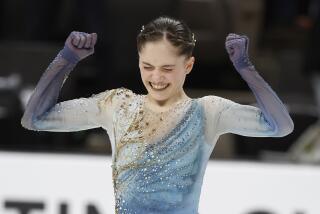Russian Leaps to the Forefront
- Share via
KITCHENER, Canada — Evgeni Plushenko reeled off two quadruple jumps and seven triples in his long program at the Grand Prix Final Friday, despite having sore groins and a tender ankle--and despite having skated a forceful short program a few hours earlier.
Imagine what the 19-year-old Russian might accomplish when he’s fit and rested.
Plushenko, the reigning men’s world figure skating champion, distinguished himself by giving two gutsy performances at the Kitchener Memorial Auditorium and taking the lead after an exhausting day. While many of those around him lost their moorings on a rink that’s 10 feet shorter than the usual 200 feet, Plushenko again gave notice he will be the man to beat at the Salt Lake City Olympics.
“Whenever I do some spins or do some steps I feel pain, but I can skate,” he said. “I had an injection and tablets. I must skate good.”
He maintained his lead despite a solid performance by compatriot Alexei Yagudin, a two-quad display by U.S. champion Tim Goebel, and a strong if quadless program that lifted Todd Eldredge from fifth to fourth. They stood in that order after the short program (worth 20% of the total score) and first long program, which was worth an additional 30% Tonight’s long programs for the men, women and pairs will count for 50%, as will the free dance.
“It’s survival of the fittest,” said Goebel, who decided in advance to substitute a triple axel for a quadruple salchow in his “Henry V” routine to save energy for tonight. “Whoever is well-trained is going to get through it the best.... I feel confident going into [tonight].”
The women’s competition was hardly the Olympic-quality showing that could be expected of skaters who had the six highest point totals in the season’s Grand Prix events.
Irina Slutskaya of Russia was ranked first in the short and long programs, although she touched her hand to the ice in landing a triple loop in the second routine. Michelle Kwan was third after the short program, in which she pulled up on a jump that was close to the boards and was slow on her spin, but moved up to second overall after the long program. Maria Butyrskaya of Russia dropped from second to third and Sarah Hughes fell in her short program and remained fourth after the long program.
Kwan, reviving the Rachmaninoff routine that earned her seven perfect 6.0s at the 1998 U.S. championships, got a 5.4 for required elements from Bulgarian judge Evgenia Karnolska.
“I’m always competing with everybody’s memories,” Kwan said. The four-time world champion and five-time U.S. champion fell on the first jump of her “Song of the Black Swan” long program, but improvised a combination and a triple jump late in the routine.
“Tonight was hard for all the girls,” Kwan said. “Mentally, it’s trying to come back and skate another program. I felt I could have been a lot stronger.”
Hughes, who defeated Kwan and Slutskaya last month at Skate Canada, fell on the triple loop in her “Ave Maria” short program, drawing gasps from the crowd of 5,665. She also stumbled on the landing of a jump in her “Turandot” long program and touched her hand down while landing a triple flip.
In a mild upset, Elena Berezhnaya and Anton Sikharulidze of Russia overtook world pair champions Jamie Sale and David Pelletier of Canada to lead the pack after their short and first long programs. Xue Shen and Hongbo Zhao of China are third, followed by Kyoko Ina and John Zimmerman of the U.S.
Marina Anissina and Gwendal Peizerat of France lead the ice dance standings, with Shae-Lynn Bourne and Victor Kraatz of Canada second and Margarita Drobiazko and Povilas Vanagas of Lithuania third.
More to Read
Go beyond the scoreboard
Get the latest on L.A.'s teams in the daily Sports Report newsletter.
You may occasionally receive promotional content from the Los Angeles Times.







